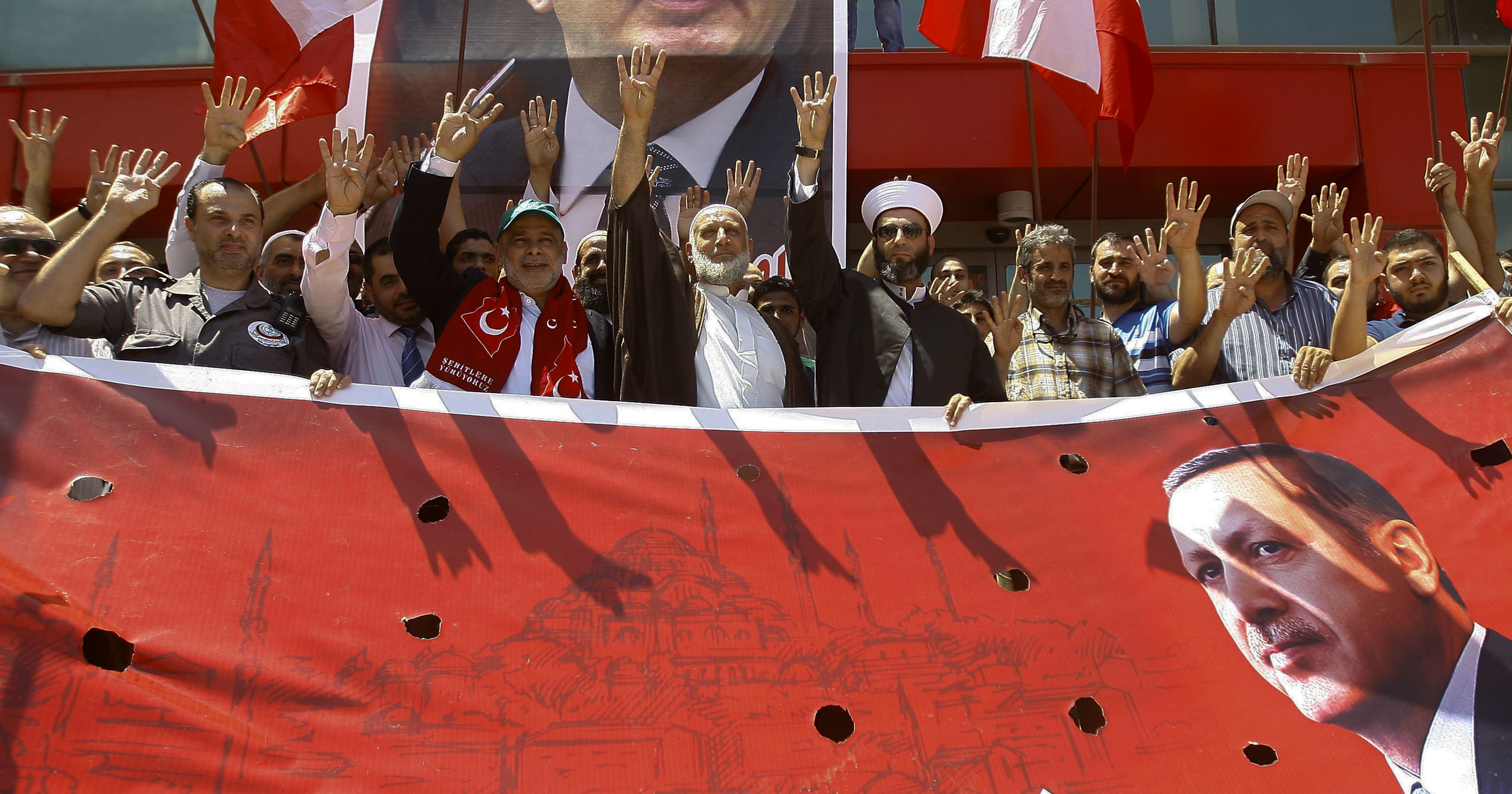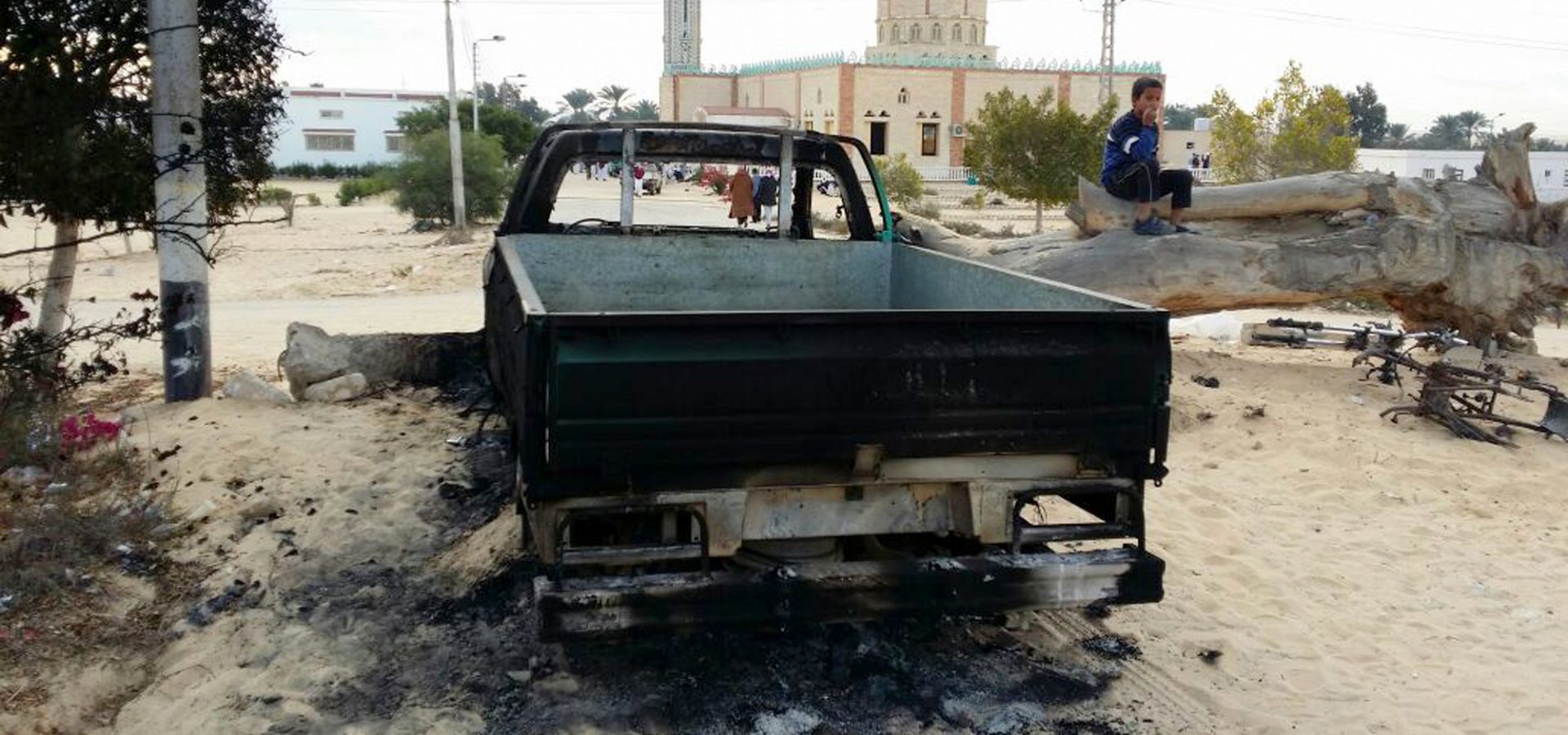235 people have been killed, according to a statement by the Egyptian Attorney General. The massacre was carried out at al-Rawdah mosque in Bir al-Abed, west of Arish city. According to eyewitnesses, there was a huge explosion, and then the terrorists opened fire on the worshippers as they prayed the Friday prayers on Nov. 24, 2017. Afterwards, the terrorists also set fire to cars, and shot at ambulances which rushed to the scene. The terrorists were dressed in military uniforms and drove a jeep, and fled with Egyptian security forces in pursuit.
On Nov. 23, 2017, the Egyptian state-run media announced they had arrested 29 suspects for 15 days, pending investigations into allegations that they engaged in espionage with Turkey, for the purpose of overthrowing the Egyptian government.
The Egyptian General Intelligence Agency stated the arrested spy network was financed by Turkey, but also supported by Qatar. The 29 member spy ring was directed by Turkish Intelligence officials, with direct Qatari coordination.
The Egyptian authorities uncovered the elaborate plot to take over power in Egypt by attacking state institutions, and the Turkish Intelligence and their global terror partner, the Muslim Brotherhood, were responsible.
In addition to the 29 arrested, there are 5 suspects abroad, who are charged with terrorism, money laundering, and illegal currency trading.
The arrested men allegedly formed a network, with members of the Muslim Brotherhood abroad, in order to destabilize Egypt and thus overthrow the government of Pres. Sisi, who is hated by the Muslim Brotherhood because he banned the group and labeled them a global terrorist organization.
Pres. Erdogan of Turkey also faced an attempt to overthrow his government in July of 2016. He is convinced that the U.S. was behind the failed attempt to remove him from power. Turkey is a member of NATO and had been a close ally of the U.S., with a large U.S. military base hosted on Turkish soil. When the U.S. attack on Syria began in March 2011, for the purpose overthrowing Syria’s Pres. Assad, Turkey and the U.S. Presisdent Obama were on the same team. However, the plan failed miserably and left Turkey standing alone, as Pres. Erdogan continued his own Anti-Israeli political tirades, which infuriated Washington, DC as the Turkish-Israeli axis was crucial to American strategies in the Middle East.
Pres. Erdogan had supported the Muslim Brotherhood candidate Mohamed Mursi, who was elected as President of Egypt, but now is in prison for murder. Ankara has kept up verbal attacks on the government of Pres. Sisi, while Cairo has answered back with accusations of supporting the Muslim Brotherhood who is considered a banned terrorist organization.
Additionally, on Nov. 23, 2017 Egyptian police killed three alleged terrorists in a shootout and arrested nine belonging to the Lewaa al-Thawra group, which is an armed group of the Muslim Brotherhood which surfaced in Egypt after the 2013 ouster of Pres. Mursi, the Muslim Brotherhood candidate who had been elected in Egypt by a rigged election engineered in part by a Washington, DC-based NGO. The official of the NGO, who is American, received a 5-year prison sentence in absentia for her role, by the Egyptian court.
The police raid in Beheira was on a homemade bomb-making facility, and the suspects opened fire as police approached, which then turned into a shootout, which left three Muslim Brotherhood terrorists dead, according to the Egyptian officials. The massacre at the al-Rawdah mosque the next day also used bombs and involved shooting, mirroring the Muslim Brotherhood group.
Members of the Muslim Brotherhood have found safe haven in Turkey, and TV stations which broadcast Muslim Brotherhood propaganda, including verbal attacks on the Pres. Sisi government, are sanctioned by the Turkish broadcast authorities.

Turkey and Qatar worked hand in hand supporting the Radical Islamic terrorists in Syria. Both countries were integral partners with the U.S.-NATO attack on Syria. However, once Pres. Trump took office, the foreign policy changed, and Turkey and Qatar were left holding the bag, and being blamed for their support of terrorism. After the elaborate Trump-Saudi terrorism summit, things changed rapidly and Qatar was singled out as the whipping boy of the region. It was Turkey who stood up in defense of Qatar, and came to their aid in their time of need when faced with a blockade.
In a recent summit of the International Federation of Red Cross and Red Crescent Societies (IFRC) General Assembly in the southern Mediterranean resort city of Antalya, Turkey, the Chairman of Qatar Red Crescent Society Mohammed Al-Maadheed has praised the cooperation with the Turkish Red Crescent. He stated, “At the international level, we are always in a very good relationship with Turkey because we have the same vision.”
However, his colleague, the director of the Qatar Red Crescent’s International Relief and Development Department, Khalid Nazem Diab, was recently named by the US as a global terrorist, and he was formerly listed similarly by the UN. Diab, an American of Syrian descent, is a financier of the armed militias in Syria, and his terrorist activity has expanded to several other hot spots.
Over three months ago, Saudi Arabia, Egypt, the UAE and Bahrain cut ties with Qatar and issued thirteen demands; the key was that Qatar stops supporting the Muslim Brotherhood and other terrorist groups. Qatar has funded terrorist groups in the Middle East for the last ten years, and participated in the attempts to overthrow major Arab governments. After Egypt’s Mubarak was overthrown in 2011, it was Qatar who funded and gave refuge to Yusuf al-Qaradawi, the Muslim Brotherhood’s theological and spiritual leader.
Qatar was uncovered recently with transporting ISIS terrorists from Syria and Iraq to Libya, from whence they travel to Egypt to attack and massacre.
General Khalifa Hafter of the Libyan National Army has revealed to the Arab media that Qatar provides financial support to ISIS.
Former U.S. Defense Secretary and CIA Director Leon Panetta also said recently that Qatar has a history of supporting terrorism. He said, “Qatar, frankly, has had a mixed record. We know they’ve provided support, financial support, for the Muslim Brotherhood, for terrorism, for Hamas, for elements of al-Qaida, the Taliban.”
The terrorists are on a round-trip-ticket: they departed Libya in 2011, arrived in Syria, and now in 2017 are arriving again in Libya. This migration movement is facilitated by Qatar, and in coordination with their partner Turkey.
Dr. Abdelmonem Saeed said in his weekly column published in Ash-Sharq al-Awsat newspaper, that the origin of terrorist ideology in the Muslim world finds itself in the Muslim Brotherhood. Saeed concluded: “The Brotherhood is the first incubator of terrorist groups and their major and global school.”
63 members of the U.S. Congress have asked Sec. of State Rex Tillerson to consider the Muslim Brotherhood Terrorist Designation Act of 2017, because the Brotherhood threatens the U.S’ national security interests and should be designated an outlawed terrorist group. The discussion on Capitol Hill concerning the Muslim Brotherhood has been bantered back and forth for years. During the Obama administration, the Muslim Brotherhood had received support and protection. The top aide to Hillary Clinton was Huma Abedin, who was the daughter of Saleha Abedin, who under Pres. Obama sat on the Presidency Staff Council of the International Islamic Council for Da’wa and Relief, a group that is chaired by the leader of the Muslim Brotherhood, Sheikh Yusuf al-Qaradawi, now in exile in Qatar.
While the Muslim Brotherhood is an outlawed terrorist organization in many countries around the globe, it has remained protected and unhindered across America. With all eyes on Egypt and the recent massacre, it remains to be seen if the Muslim Brotherhood in USA may have worn out their welcome.
Top photo | A burned truck is seen outside Al-Rawda Mosque in Bir al-Abd northern Sinai, Egypt a day after attackers killed hundreds of worshippers, on Saturday, Nov. 25, 2017. Friday’s assault was Egypt’s deadliest attack in the country’s modern history, a grim milestone in a long-running fight against an insurgency. (AP/Tarek Samy)
Steven Sahouni is an independent Syrian political analyst and writer based out of Lebanon; he has been covering the Syrian crisis since it’s onset in 2011 and has published several articles in numerous media outlets – He is regularly interviewed by US, Canadian and German media.


